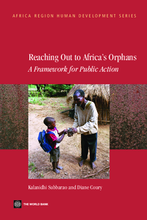This report examines and discusses the risks faced by African orphans and vulnerable children (OVCs); the costs and pros and cons of interventions working with OVCs; and provides guidance on what kinds of intervention or approaches might work in a given country context or situation.
The study emphasizes three concerns: the vulnerabilities associated with orphanhood require immediate attention; there is an urgent need to target assistance to the neediest children; although there is still no blueprint on the best way to scale up interventions, the World Bank’s multicountry AIDS programs offer an opportunity to pilot assistance efforts and to extend assistance to as many of the needy as possible.
The study reviews of diverse nature of the risks faced by OVCs; the needs of vulnerable children; and the caregivers to OVCs. It also reviews the nature of interventions and the various ways in which public action could strengthen community action; outlines the methodological difficulties of cost comparisons; reviews a number of intervention options and costs; and finally provides an overview of the issues in scaling up interventions and requirements for undertaking monitoring and evaluation.
The study’s conclusions and recommendations include:
- prior to launching any intervention on the behalf of OVCs, agencies and organisations must ensure that they are aware of children’s risks and needs
- community driven interventions at the household level appear to be the most cost effective, and formal orphanages appear to be prohibitively expensive
- community-driven development initiatives are an opportunity to scale up efforts by devolving funds to communities and local authorities and empowering them to launch protective programs in behalf of orphans and vulnerable children
- sectoral and economic policies are more appropriate in countries or regions characterised by generally low access to basic services. Waiving school fees and uniform obligations would increase the general enrolment among all without any specific orphan-based targeting
- poverty targeting measures are required where there is inequality between poor and nonpoor in access to services. Conditional self-targeting cash transfer programmes appear promising, especially in countries where poverty targeting based on an assessment of individual households is infeasible
- transfer assistance to orphans is effective when they suffer from discrimination no matter the wealth status of their families
- transfer assistance to the most-at-risk children regardless of orphan and wealth status, is appropriate where it is possible to identify the risk patterns.
©The World Bank

